Your hotel gets traffic. People visit your website, browse your rooms, maybe even click around.
But then… nothing. No booking. No email. No follow-up.
That’s the situation most hotels face right now.
The problem? You’re not capturing leads.
Maybe your website isn’t set up to collect details. Or maybe you're relying too much on OTAs to bring in guests. Either way, you're missing out on direct relationships and revenue.
Without leads, you can't follow up. You can't send offers. You can't build loyalty. It’s like letting potential guests walk in, look around, and leave without a trace.
But here’s the good news: lead generation for hotels isn’t complicated.
You just need the right starting steps—simple systems that work in the background while you focus on running your hotel.
In this guide, we’ll discuss 10 easy, proven ways to kickstart your hotel lead generation. Whether you're starting from zero or trying to do better, these will help you capture more leads and book more direct stays.
Let’s dive in.
What is Lead Generation for Hotels?
Simply put, hotel lead generation is the process of collecting contact details from people who are interested in your hotel but haven’t booked yet.
It could be someone who viewed your rooms, clicked on your ad, or followed you on Instagram. Instead of letting that interest fade, you collect their email, phone number, or WhatsApp opt-in.
Now you can follow up later with a personalized offer or reminder. That’s the difference between passive traffic and active leads. Leads are people you can actually talk to.
It’s a smart way to stay on a guest’s radar even if they’re not ready to book right now.
And when done right, lead generation for hotels helps increase direct bookings and reduce reliance on third-party platforms.
So, how do you get started with all this, even if you’re new?
Let’s walk through it step by step.
How to do Lead Generation for Hotels from Scratch
Generating leads doesn’t have to feel overwhelming.
Once you understand where most hotels go wrong—from unclear targeting to scattered follow-ups—you can start building a lead generation system that’s clear, repeatable, and works.
This section walks you through how to start lead generation for hotels from the ground up—no big budgets or tech skills required. Just smart steps that set you up for long-term success.
1. Lay the Groundwork with a Basic Online Presence
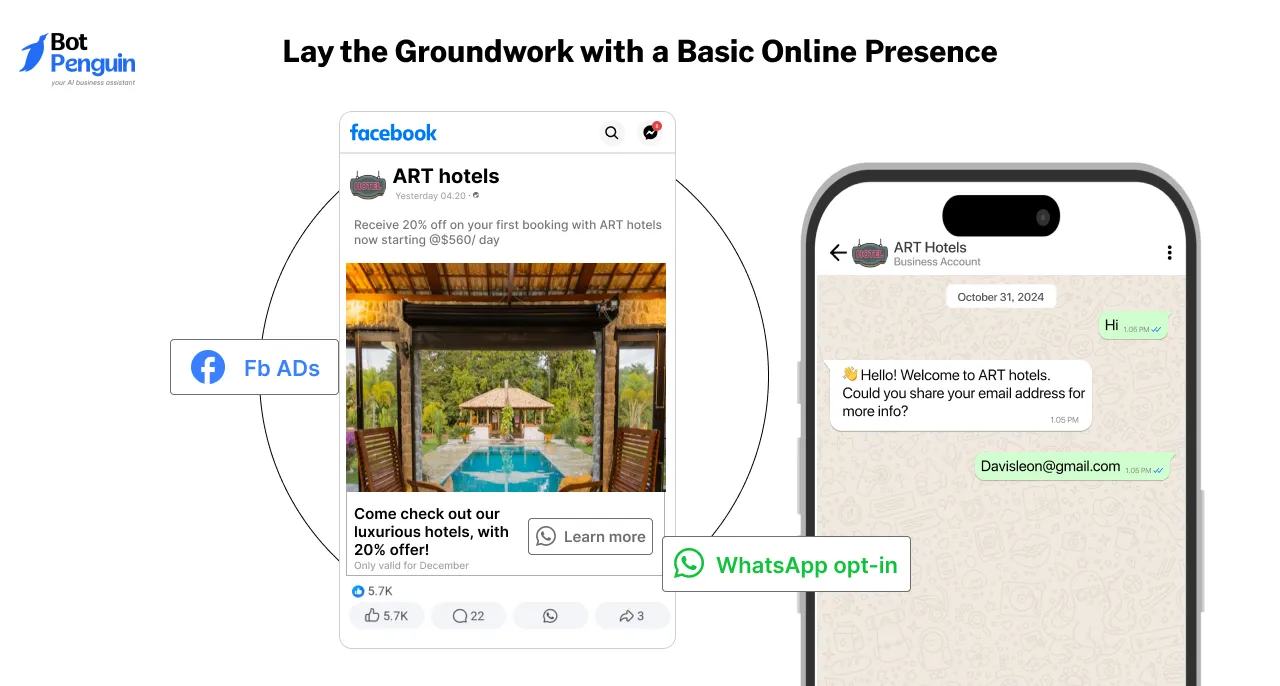
Whether you’re starting fresh or already active on a platform or two, the key is making sure potential guests can easily find and reach you online.
But, no digital presence yet? Don’t stress.
You don’t need a full website to begin. Just pick one place where guests can learn about your hotel or contact you directly.
Try these simple starting points:
- Google Business Profile
- Facebook Page
- WhatsApp Business
If you’re already on some platforms, focus on optimizing them. Make sure your contact info is clear, and your pages invite interaction, like direct messages or booking inquiries.
Having at least one solid online spot is your base. From here, you can start collecting leads and building relationships.
2. Get Clear on Who You Want to Attract
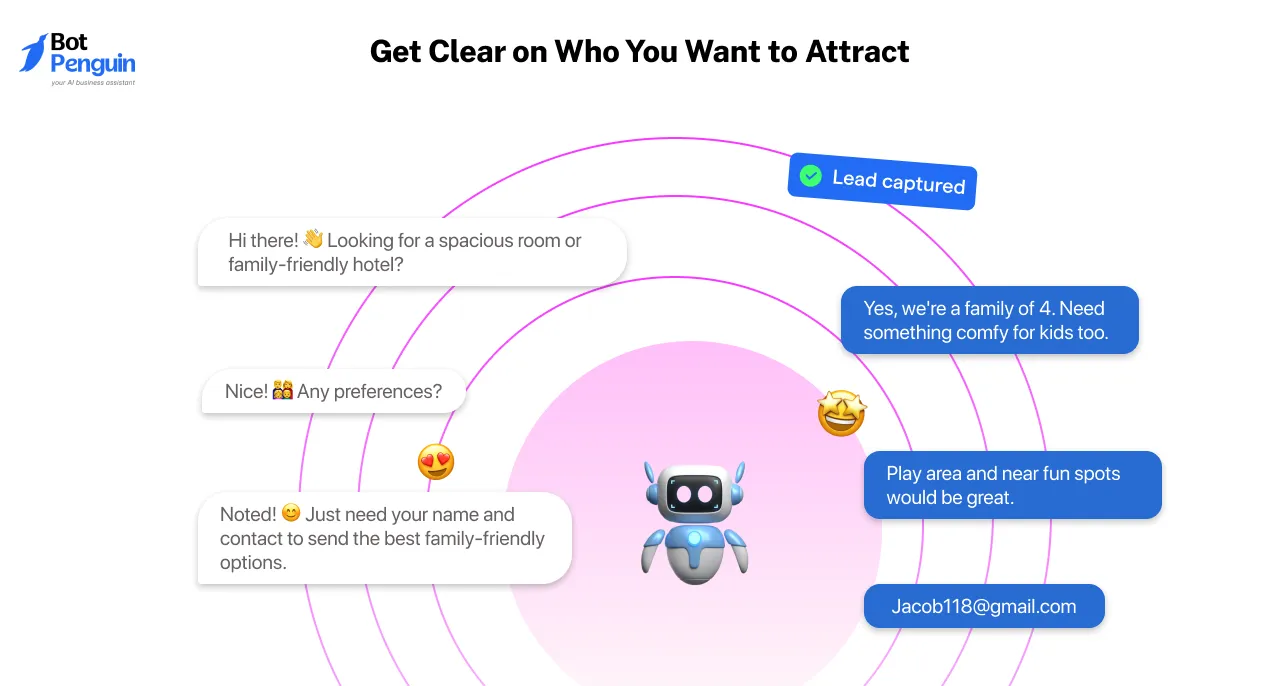
Before you dive into collecting leads, define your target guest segments.
Knowing who you want helps shape your messages, offers, and where you promote your hotel.
- Are you aiming to bring in business travelers who need strong Wi-Fi and early check-in?
- Couples looking for weekend getaways with sunset views?
- Or families searching for spacious rooms and kid-friendly spots nearby?
A hotel in a quiet hill town might focus on digital nomads escaping city noise, while a beachfront resort could attract couples celebrating anniversaries.
Writing down 2–3 guest types helps guide your hotel lead generation strategies.
When your messages speak directly to your ideal guest, your chances of generating quality leads increase, whether you’re running local ads or just updating your Instagram captions.
3. Pick One Easy Way to Collect Leads
You don’t need to be everywhere at once.
Start small by picking one simple, manageable lead capture method that fits your hotel and skills.
- No website yet? Use Facebook lead forms, Instagram DMs, or WhatsApp buttons to collect interest.
- Have a website? Add a basic form or pop-up offering a small perk in exchange for contact info.
Even a WhatsApp auto-reply that says, “Want early check-in? Send us your email, and we’ll notify you when rooms open,” can help generate leads for hotels passively.
Focus on one channel you’re comfortable with. This lets you test what works without stress, while still making it easy for guests to connect.
4. Offer Something Guests Actually Want
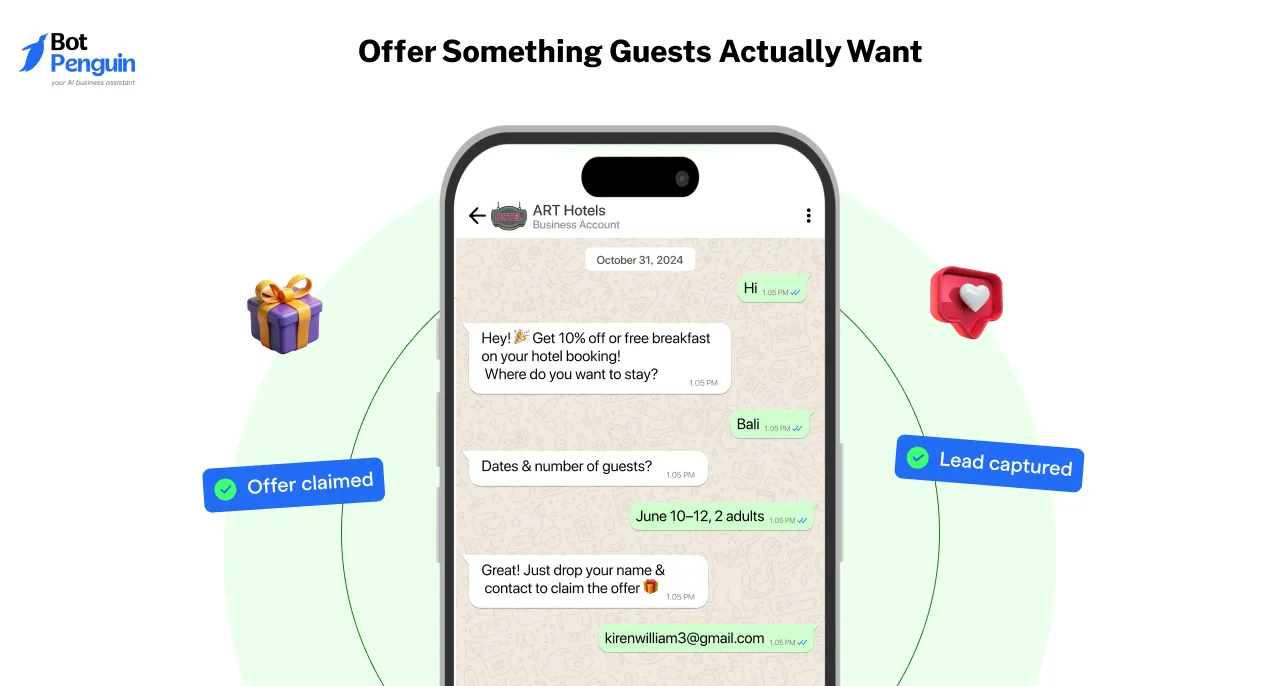
People won’t share their contact info without a reason. A lead magnet gives them a clear benefit for doing so.
Think of things your ideal guest values:
- A first-time booking discount
- Free late checkout
- A local travel guide for weekend plans
- Early access to limited-time room packages
For example, if you're located near a national park, offer a “Top 5 Hidden Trails Near Our Hotel” guide in exchange for their email. Or if most bookings come from city dwellers, send out exclusive last-minute escape deals to your list.
It doesn’t have to be big—it just has to feel useful or special.
The clearer and more tailored your offer, the more leads you'll collect.
5. Keep Track of Your Leads in One Place
Collecting leads is just the start. To turn leads into bookings, you need to organize and follow up.
A simple Google Sheet works well at first.
Log guest names, contact info, how they found you, what they signed up for, and when to follow up.
If you want to go a step further, use free tools like HubSpot or Zoho CRM to automate your responses, like sending a welcome message or a reminder about an unclaimed offer.
Even just labeling chats in WhatsApp Business as “New Lead” or “Hot Lead” can keep your follow-ups clear and timely.
For instance, if someone messaged you after seeing your Instagram Story, following up the next day with availability details could be the nudge they need to book.
Organized leads mean fewer missed chances and more confirmed stays. Once these five pieces are in place, everything else gets easier.
You’ll know who you’re targeting, where they can find you, how to connect with them, and what to offer in return. You’ll also have a simple way to keep track of every lead that comes in.
From here, you’re no longer guessing—you’re building a lead generation system that fits your hotel, your pace, and your guests.
Next, we’ll dive into smarter hotel lead generation strategies that help you grow faster, reach further, and turn more interest into actual bookings.
5 Hotel Lead Generation Strategies That Deliver Results
Once you’ve got the basics of lead generation for hotels in place, the next step is to build momentum with strategies that bring in consistent, qualified traffic.
It’s not just about collecting names on a list. It’s about attracting potential guests who are the right fit, and then guiding them to book directly with you.
From boosting visibility to automating follow-ups, these five strategies are built for hotels ready to compete smart, not just spend big.
Let’s explore what works in today’s competitive hotel space.
6. Use Local SEO and Optimize Google Business Profile
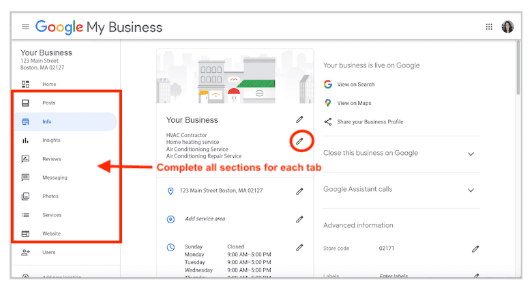
Imagine a traveler searching “best boutique hotels in Goa” or “family-friendly stays near Yellowstone.”
If your hotel doesn’t show up, you’re invisible to people actively looking to book.
That’s where local SEO kicks in. Start by making sure your hotel’s website includes:
- City or neighborhood-specific keywords in page titles and content
- A dedicated page for each location if you operate in multiple cities
- Up-to-date meta descriptions with phrases like “luxury hotel in [location]”
But SEO doesn’t stop at your website. Your Google Business Profile is your digital storefront.
Add professional images—rooms, pool, food, and views. Keep business hours and contact info updated. Encourage happy guests to leave reviews.
A well-optimized profile can help drive hotel lead generation directly from Google Maps or mobile search, especially for last-minute travelers.
7. Run Paid Ad Campaigns to Fill Gaps in Demand
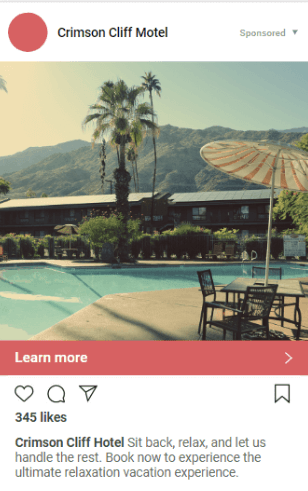
Let’s say you’re a beachfront hotel that sees a dip in bookings right after school holidays. Or a business hotel that's empty over weekends.
Paid ads help you target specific audiences during these low-demand windows.
Use Google Ads to show up when someone searches “weekend getaway deals in Miami.” Set filters for location, device, and booking window.
If you’re targeting a younger audience or promoting visual experiences, like rooftop dining or sunset views, Instagram and Facebook Ads are your go-to. These platforms are especially powerful for showcasing lifestyle and emotion.
Example: A campaign like “3-Night Romance Package: Ocean View Room + Dinner Included” can resonate well with couples planning a quick escape.
Don’t forget retargeting. Many people browse, get distracted, and leave. Showing them an ad like “Still dreaming of ocean views?” with a gentle nudge can reel them back in.
8. Automate Follow-Ups and Nurture Campaigns
Here’s a common issue: someone fills out your inquiry form. You wait a day to reply. By the time you do, they’ve already booked elsewhere.
Following up with leads manually can quickly become overwhelming, especially when inquiries come in from multiple platforms at different times of day.
Without a consistent system in place, some leads slip through the cracks. And in hospitality, delayed responses often mean lost bookings.
That’s why automating your follow-ups is key to improving conversions. It ensures every lead receives a timely, personalized response—without you having to chase every single one.
For example, say a guest downloads your seasonal getaway offer. They instantly receive a thank-you email. A day later, they get a follow-up with package details, and another prompt a few days later with a special limited-time deal.
These touchpoints keep your hotel fresh in their mind and gently guide them toward booking, without being pushy.
When done right, automated nurture campaigns help build trust, maintain engagement, and turn interest into action—all with minimal manual effort.
9. Partner with Travel Bloggers and Local Businesses
Sometimes the fastest way to build credibility is to borrow it.
Collaborating with travel bloggers or micro-influencers in your niche can introduce your hotel to new, relevant audiences.
Example: If you’re a nature-focused eco-stay in Costa Rica, partner with sustainability influencers or travel vloggers who focus on eco-tourism. They can share authentic content like behind-the-scenes videos, room tours, or experience-based reviews.
This content can drive a steady stream of curious, qualified leads your way. Also, consider local business partnerships.
If you’re located in a wine region, team up with vineyards to offer wine tasting packages. City hotel? Partner with tour guides, yoga instructors, or local restaurants.
Cross-promotions like “Stay with us and get a free dessert at Café Azul” create added value and help you tap into another business’s loyal customer base.
Done right, these partnerships can generate warm leads who trust the recommendation even before visiting your site.
10. Encourage Repeat Bookings with Loyalty and Referral Programs
Not every lead has to be brand new.
Your past guests are your warmest audience—and one of your best hotel lead generation assets.
Start with a simple loyalty program.
Offer returning guests perks like:
- 10% off their next booking
- Free upgrades for staying more than twice
- Early check-in or late checkout privileges
The goal is to make them feel valued and keep your hotel top of mind when they plan their next trip. Then, add a referral program.
Give past guests a reason to spread the word. Example: “Refer a friend and both of you get $25 off your next stay.”
You can track this with simple codes or CRM tools, or even automate the process using platforms like ReferralCandy or Trello + email.
One real-world case: A boutique hotel in Bali offered guests a free airport pickup if they referred someone who booked a 3-night stay. Within 3 months, 15% of their bookings came from referrals.
These strategies don’t just generate new leads—they build a cycle of trust, reward, and loyalty that compounds over time.
Together, these five strategies form a strong foundation for lead generation for hotel owners looking to compete in today’s digital-first travel landscape.
You don’t have to implement them all at once. Start with one or two, test what works for your audience, and refine from there.
But here’s the real game-changer—automation.
In the next section, we’ll show you how to streamline these lead generation steps so they work for you behind the scenes. Less manual work, more bookings.
9 Bonus Tips: Implement Lead Generation Automation for Hotels
Once you’ve set your hotel lead generation strategies in motion, the next step is making them work 24/7—without manual effort.
Automation lets you follow up with leads instantly, send reminders, and personalize guest experiences, even when your front desk is off-duty.
From your website to WhatsApp and Instagram, automation helps capture, engage, and convert leads faster. When done right, it feels seamless and personal to the guest, but behind the scenes, it saves hours of repetitive work.
Let’s explore how you can automate each touchpoint to keep your lead generation engine running on autopilot.
11. Chatbot Usage: For Automation Across Multiple Platforms
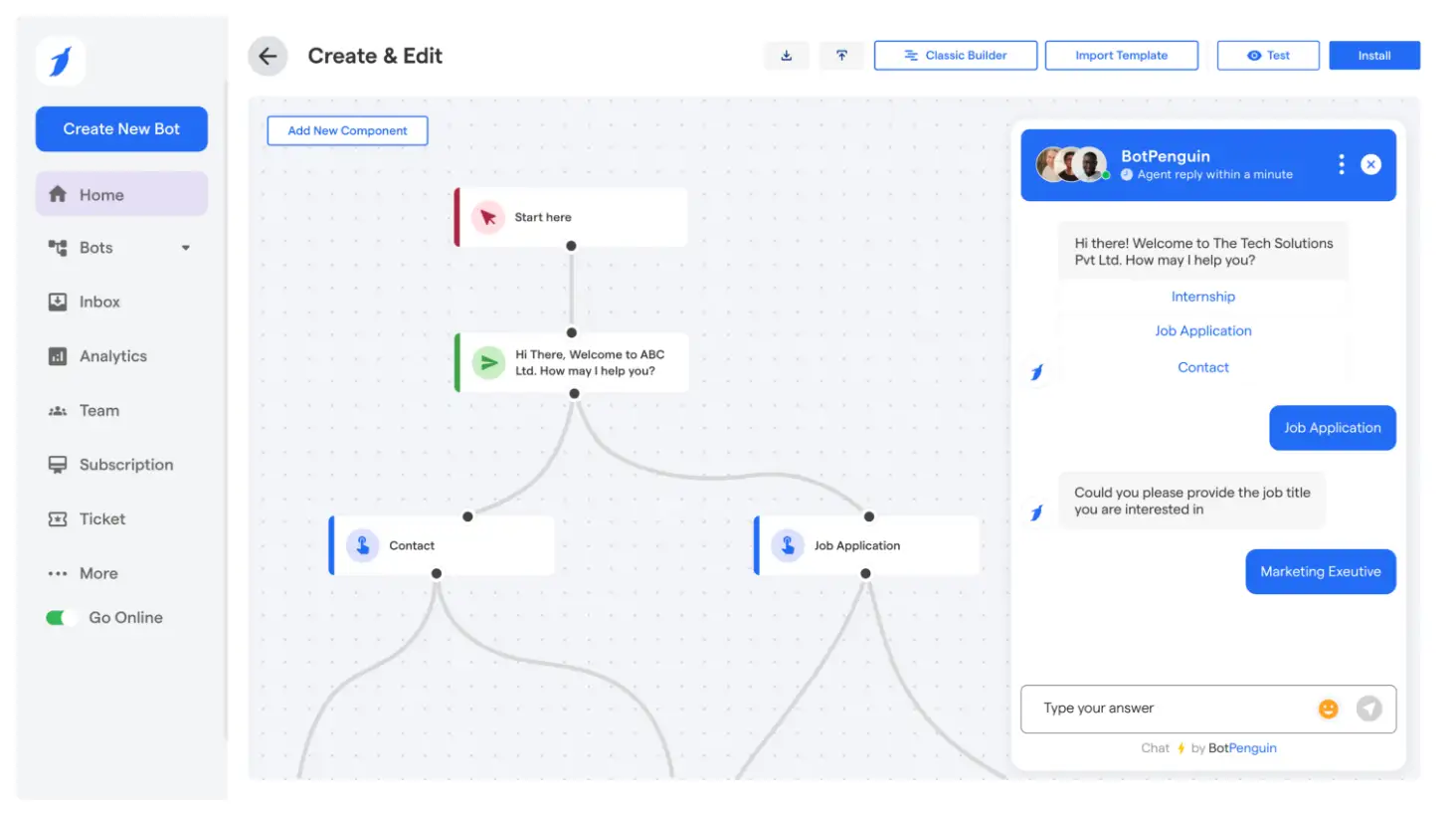
Chatbots are a game-changer for any hotel looking to improve its guest interaction.
They can engage visitors, provide immediate responses, and guide users through the booking process, all while capturing valuable lead information.
For example, when a potential guest visits your site, the chatbot can instantly ask if they need help finding the right room, offer special discounts, or even gather their contact details for follow-up.
On social media platforms like Instagram or Facebook, a chatbot can automatically answer common queries, qualifying leads without you lifting a finger. The real-time engagement fosters trust and increases the chances of conversion.
Tools-To-Use:
- BotPenguin: Ideal for seamlessly integrating with your website, Facebook, Instagram, and WhatsApp. It helps make the automation seamless by integrating across all major platforms, including WhatsApp.
By combining chat automation with CRM data, BotPenguin can track guest preferences and offer personalized responses, making the experience even more efficient.
12. Lead Capture Forms: Automate Data Collection with Ease
Lead capture forms are essential for collecting guest information on your website.
You can set up dynamic lead capture forms that pop up when users show interest in booking a room or looking at specific packages. The forms can request contact details, travel dates, and other preferences.
But instead of manually sorting through data, why not automate the collection and integrate it into your CRM?
Tools-To-Use:
- Typeform: Simple forms that automatically sync with your CRM tools.
- HubSpot Forms: These forms streamline lead capture and integrate with CRM systems for seamless follow-up.
And when these forms are integrated with a tool like BotPenguin, you can even automate the process of asking for this information via chat.
This eliminates friction in the guest experience, making it simple for them to submit their details. Plus, this data automatically syncs with your CRM, saving you time while organizing leads for future follow-up.
13. Automated Email Sequences: Nurture Leads Without Lifting a Finger
Automating email sequences allows you to stay top of mind with leads and guests.
From welcoming a new lead to sending them booking reminders or promotional offers, automated emails nurture the relationship.
Tools-To-Use:
- Mailchimp: Set up workflows that trigger emails based on guest activity.
- ActiveCampaign: Automate personalized emails based on user behavior and preferences.
Again, by integrating a chatbot tool like BotPenguin with your email system, you can gather crucial data during conversations, such as preferences or specific questions a guest may have.
This data can then be used to trigger more personalized follow-up emails, increasing the likelihood of conversion.
For instance, if a lead asks about a particular room type, the chatbot can add this info to your CRM, and the email sequence could include relevant offers or availability for that specific room.
Automated email sequences make it easy to keep your guests engaged, reducing the chances of them forgetting about their interest in booking.
14. SMS Automation: Send Instant Booking Confirmations & Reminders
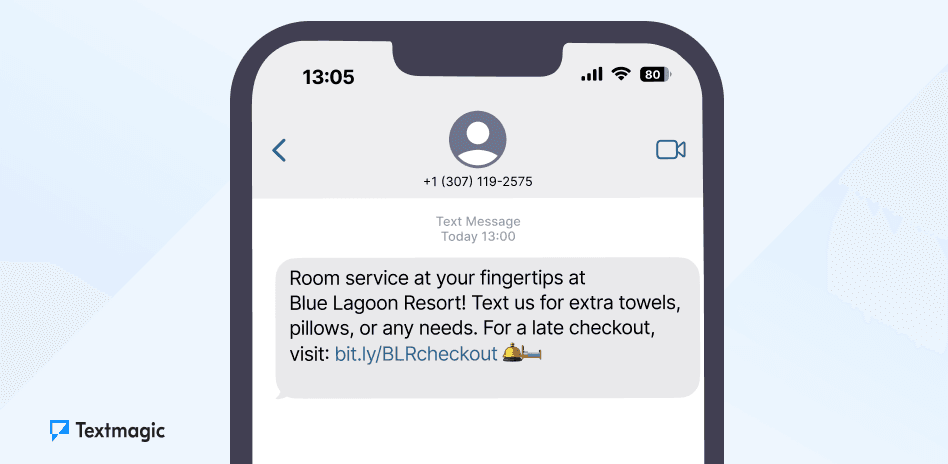
Text messages have open rates north of 90%, making them a powerful tool for hotel lead generation.
With automated SMS, you can instantly send booking confirmations, reminders, and even promotional offers to your leads.
Tools-To-Use:
- Twilio: Use for mass SMS sending and automation.
- SMSBump: A tool for SMS marketing with automation features.
After a guest books their stay, automated SMS messages can be sent to confirm their reservation. Should a guest abandon the booking process midway, an SMS reminder can nudge them to complete their reservation.
SMS automation also ensures all messages are personalized and timely, enhancing the guest experience and reducing booking abandonment.
15. Click-to-WhatsApp Ads: Drive Instant Engagement from Ads
Click-to-WhatsApp Ads allow guests to directly message your hotel via WhatsApp from an ad, eliminating the need for them to fill out forms or navigate a landing page.
This direct engagement results in quicker conversations and higher conversion rates.
Tools-To-Use:
- BotPenguin: Fully integrates with WhatsApp to automate lead capture and follow-up. When potential guests click your ad, BotPenguin can start a conversation on WhatsApp right away, answering questions and gathering lead data.
The chatbot can share room details, special promotions, or even book rooms directly through WhatsApp. By automating these interactions, you can engage with leads instantly, keeping them from losing interest.
16. Instagram Comment-to-DM: Turn Comments Into Private Conversations
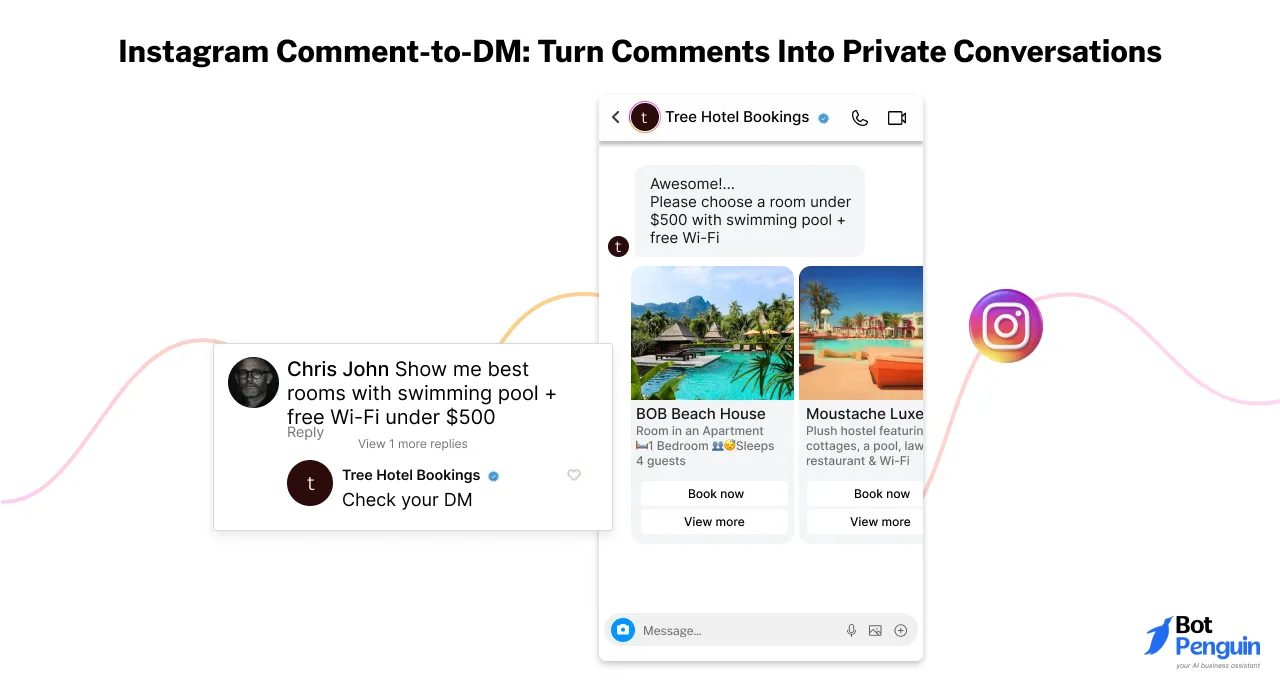
The Instagram Comment-to-DM feature allows you to turn public comments on posts into private, direct conversations.
This is an easy way to engage with people who are already interested in your content and convert them into leads.
Tools-To-Use:
- ManyChat: Automates Comment-to-DM conversations on Instagram.
- BotPenguin: Automates direct messages based on comments.
For instance, once someone comments on your Instagram post, BotPenguin can automatically send a personalized message via DM, offering more details about your property or answering specific inquiries.
If someone expresses interest in a special deal or a specific room, the chatbot can even offer a tailored offer, enhancing the chances of conversion.
This direct, private messaging not only improves engagement but also builds a stronger connection with potential guests.
17. CRM Automation: Organize, Segment, and Nurture Leads
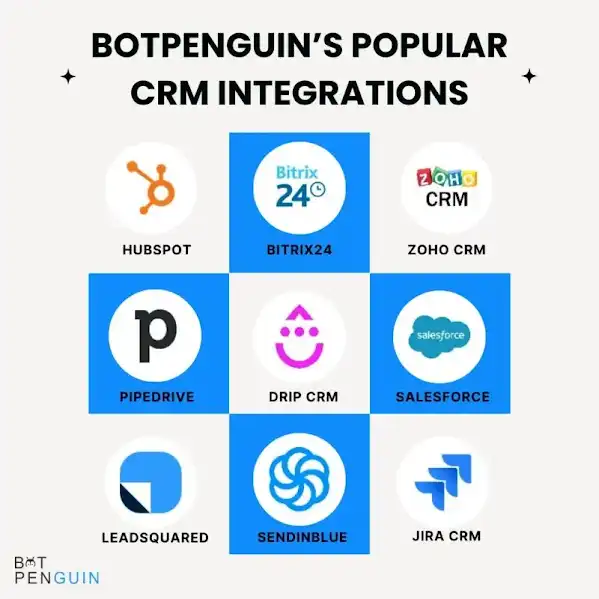
CRM systems allow you to organize and segment your leads efficiently. By automating tasks like follow-ups, lead nurturing, and data entry, you save time and ensure no lead is left behind.
Tools-To-Use:
- Salesforce: Manage and automate CRM tasks with ease.
- HubSpot: Powerful automation and lead tracking.
While these are known platforms, by integrating a chatbot like BotPenguin with your CRM, each lead captured is automatically added to your system, with details like their preferred room type or booking dates.
Your CRM then triggers follow-up actions such as emails or SMS messages, ensuring a smooth and personalized experience.
In these cases, BotPenguin ensures all interactions are logged, reducing manual work and improving lead management efficiency.
18. Booking Engine Automation: Recover Abandoned Bookings
Booking abandonment is a common challenge, but with booking engine automation, you can recover those lost opportunities.
Automated reminders and personalized messages can help get those potential guests back to complete their booking.
Tools-To-Use:
- Checkfront: Automates the booking recovery process.
- ResNexus: Excellent for booking reminders.
When a guest starts a booking but doesn’t finish, an automated message can be sent by a chatbot like BotPenguin via SMS, email, or WhatsApp. The message helps remind them of the rooms they viewed or give a limited-time discount to encourage them to complete their reservation.
The seamless automation of this process makes it much easier to recover abandoned bookings and increase overall conversions.
19. Review Request Automation: Turn Happy Guests Into Advocates
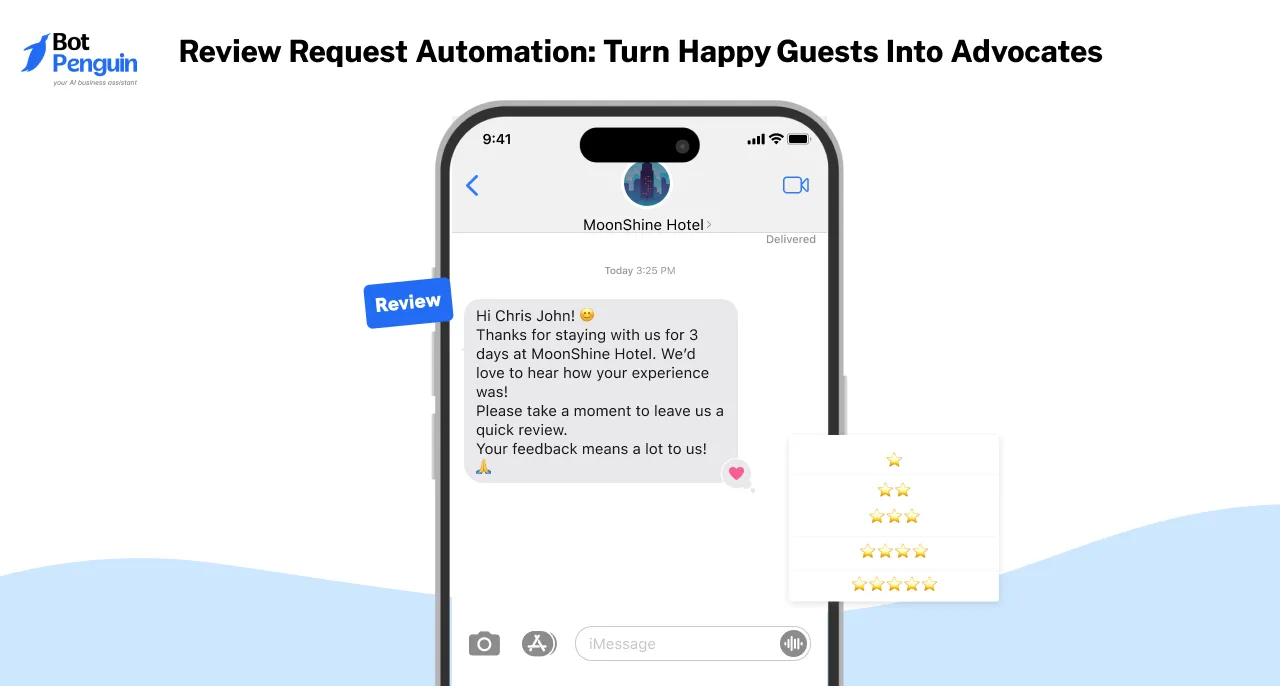
Getting reviews is vital for your online reputation, but asking guests manually can be time-consuming. By automating this process, you can gather valuable feedback without extra effort.
Tools-To-Use:
- Trustpilot: Automates the review collection process.
- BotPenguin: Sends personalized, automated review requests across multiple channels post-checkout.
After a guest’s stay, chatbots like BotPenguin can automatically send a personalized message asking for a review. Whether through WhatsApp, email, or SMS, the request will be tailored to the guest's experience.
This way, you can generate positive reviews that help build trust with future guests while increasing your property’s visibility.
By tying all your hotel lead generation tactics together with automation, you don’t just save time—you multiply your impact.
Whether it’s through chatbots, emails, or WhatsApp flows, tools like BotPenguin make it easy to build these systems without complexity.
The result? A guest journey that feels personalized, fast, and helpful, without stretching your team thin.
Conclusion: Start Small, Scale Fast with the Right Lead System
If you’ve made it this far, one thing is clear—hotel lead generation isn’t just a marketing buzzword.
It’s the foundation of consistent bookings, guest engagement, and long-term growth.
Throughout this guide, you’ve explored real, actionable hotel lead generation strategies - from chatbots and CRM integrations to automated emails and booking reminders.
These aren’t just ideas; they’re practical steps that show you how to generate leads for hotel businesses in a way that’s efficient and scalable.
But here’s the challenge: implementing all of this manually is time-consuming and often unrealistic for small teams.
That’s why lead generation automation for hotels is no longer optional—it’s essential.
Tools like BotPenguin simplify this journey.
Whether you’re automating conversations on your website, capturing leads from Instagram, or sending follow-ups via WhatsApp, BotPenguin brings all your efforts into one unified, easy-to-manage system.
It’s designed to help you act fast, without being a tech expert.
And the best part? You can try BotPenguin completely FREE, with no credit card required.
Get a feel for what works. Scale only when you’re ready. From basic chatbot flows to advanced integrations, the platform grows with your needs.
So don’t wait to build the perfect system.
Just pick one tactic. Automate it. And start building a smarter, faster lead generation for hotel workflow today!
👉 Try BotPenguin now and see the difference.
Frequently Asked Questions (FAQs)
Why is lead generation important for hotels?
It helps hotels consistently fill rooms, reduce dependency on third-party platforms, and build direct guest relationships.
Effective lead generation boosts occupancy rates, lowers acquisition costs, and supports long-term brand loyalty.
What are effective lead magnets for hotels?
Popular lead magnets include exclusive discounts, early bird offers, free local travel guides, and limited-time packages.
These can be promoted via social media, email, or on your website to encourage signups.
What channels work best for hotel lead generation?
Top-performing channels include SEO-optimized websites, social media ads (especially Instagram and Facebook), Google Hotel Ads, WhatsApp, and email marketing. Each channel can funnel leads into automated systems for nurturing.
What is the role of social media in hotel lead generation?
Social media helps hotels attract, engage, and convert leads through targeted ads, influencer partnerships, and tools like Instagram Comment-to-DM or Click-to-WhatsApp for quick conversations and lead capture.
How do you measure hotel lead generation success?
Track metrics like lead volume, conversion rate, cost per lead, and ROI from campaigns. Also monitor guest engagement, form submissions, and booking completion rates across platforms.
What’s a good tool to get started with hotel lead generation?
BotPenguin is a great tool for beginners. It offers no-code chatbots, integrations with CRMs and booking engines, and automation tools—all with a free trial and no credit card required.



